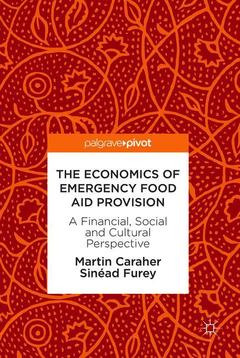The Economics of Emergency Food Aid Provision, 1st ed. 2018 A Financial, Social and Cultural Perspective
Auteurs : Caraher Martin, Furey Sinéad

This short book reviews the provision of food bank and other emergency food aid provision with a specific focus on the UK, whilst drawing lessons from North America, Brazil and Europe. The authors look at the historical positioning of food aid and the growth of the food aid sector in the UK following the period of austerity 2007-2012, before addressing the causes of food insecurity and concluding that food banks are a symptom of austerity and government inaction which fail to tackle the underlying causes of food poverty. The research is timely, and considers a range of disciplines and practices. This book will appeal to researchers, policy makers and practitioners food economics, welfare economics, public policy, public health, food studies, nutrition, and the wider social sciences.
1. The Growing Problems of Food Poverty and Insecurity.- 2. Growth of Food Banks in the UK (and Europe): Leftover Food for Leftover People.- 3. The Cultural and economic Dimensions of Food Poverty.- 4. Food Banks and their Contribution/Detraction from Welfare Budgets.- 5. Conclusion: So What is the Future?
Date de parution : 06-2018
Ouvrage de 111 p.
14.8x21 cm



